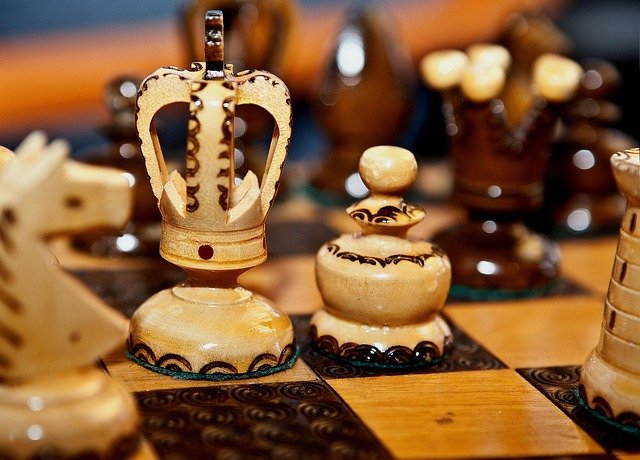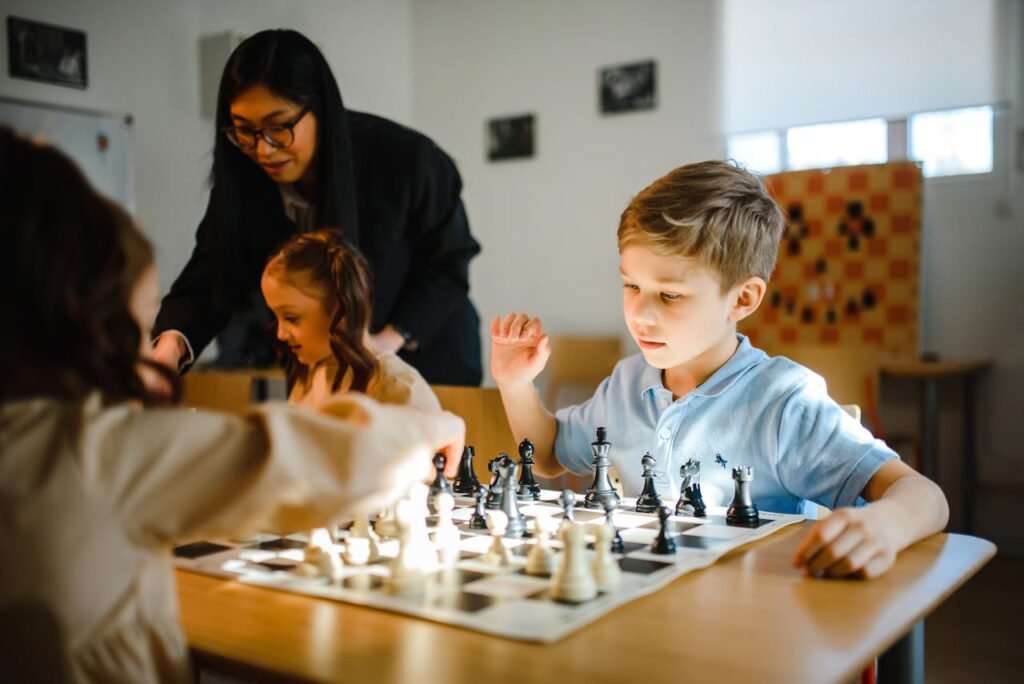Welcome to Sint-Michiels—a quiet, friendly part of Bruges where families care about smart, happy learning. If your child loves chess—or is just curious—we are here to help.
We are Debsie, an online chess academy with warm coaches and a clear plan. We teach live, step by step, in simple words. Kids speak, think, and play in every class. We build real skills that last: focus, patience, and calm thinking under pressure. These skills help on the board and in school too.
You do not need to drive or wait. Your child learns safely at home, with a coach who listens and guides. We set small goals each week, track progress, and send you a short note you can read in one minute. It is steady, friendly, and effective.
Try one class. Feel the difference in the first hour. If your child smiles and learns one clear idea today, that is a win.
Book a free trial now: https://debsie.com/take-a-free-chess-trial-class/
Online Chess Training
Online chess training is simple and strong. Your child sits at home, opens one link, and meets a real coach in a live class. They see the board on screen. They speak. They ask questions. They move pieces. They try ideas right away. The coach gives feedback in seconds, not days. Learning feels close and safe. There is no bus ride, no traffic, no parking hunt. All the energy goes into thinking and play.
This way of learning suits young minds. We teach one clear idea, then we test it in the same session. The brain likes small steps. When a child hears, tries, and reviews in a short loop, the idea sticks. We do not drown kids in big theory. We use tiny, sharp moments: “What is the threat?” “Which square is weak?” “If the knight jumps, what changes?” These short questions build calm habits. Your child learns to pause, check, and choose.
Practice becomes easy too. After class, your child can do a five-to-ten minute puzzle set that matches the lesson. The puzzles are not random. They are picked for your child’s level and the skill we just taught. Two days later, we peek at the results and adjust next week’s plan. This keeps growth steady. There is no guesswork. You see small wins pile up, week by week.
Online also gives focus. A busy room can make shy kids quiet and active kids distracted. At home, the space feels safe. If a child needs a moment, they can mute, breathe, and return. We use short breakout rooms to pair students by level for mini-games. These quick games have a purpose, like “finish the endgame with clean technique” or “find all checks before each move.” After six or eight minutes, we come back and learn from key moments.
Parents stay close without hovering. You can peek for one minute and see the lesson theme. You get a short note after class: one strength we saw, one habit to build, and one tiny task for the week. You do not have to be a chess expert to support your child. You just keep routine and cheer small steps. That is enough. We do the heavy lifting.
If you live in Sint-Michiels, you know how evenings can fill fast. Online fits life. Your child can join after homework and still have dinner on time. If there is a school event, we can shift the class or share a replay. If your child is under the weather, they can rest and catch up later. The learning path stays clear.
Would you like to see this in action? Take one free class. In sixty minutes, your child will learn one idea, try it in a guided game, and walk away with a simple plan for the week. You will feel if this is right for your family.
Book your free trial now: https://debsie.com/take-a-free-chess-trial-class/
Landscape of Chess Training in Sint-Michiels, Bruges, and Why Online Is the Right Choice

Sint-Michiels is calm and green, with schools, parks, and busy family life. Children here do many things—languages, music, sports, and clubs. Time is precious. Even a short ride across Bruges can stretch into a long evening. On wet days, travel is harder. In winter, it gets dark early. Parents want safe learning that fits the clock and keeps stress low.
Local chess options can be friendly. A school room might host a weekly group. A nearby club may run casual nights. These can be nice for social play, but the teaching is often mixed. Beginners and strong kids share one space. The coach tries to help all, yet the plan bends to the middle. Some students wait, others rush, and clear progress is rare. Games eat the hour. Lessons get short. Feedback arrives late, if at all.
Online training fixes these issues for Sint-Michiels families. First, placement is exact. We group by level and age, so your child learns with peers who feel the same push. The class begins on time and ends on time. Every minute is used. There is no setup, no cleanup, no chatter that swallows the lesson.
Second, the path is steady. We follow a curriculum with small goals. We teach a theme, test it, and track it. If your child misses a week, we have a replay and a short make-up plan. They never feel lost. Small gaps get closed quickly. Confidence stays high.
Third, reach grows. Your child meets students from other cities and countries. This widens the mind in a gentle way. Children hear new voices, see new styles, and learn respect. When they later sit at a board in a local event, they feel calm because they have met many patterns and people before.
Finally, online protects evenings. You keep the car in the driveway. You keep siblings on their own routine. You keep dinner warm. No one is waiting in a hall or circling for parking. The house feels peaceful. This calm helps learning. A calm mind thinks better, not only in chess but in schoolwork too.
For Sint-Michiels, online is the right choice because it is safe, structured, and flexible. It works on normal weeks and it still works when life gets busy. It helps shy children find their voice and active children find their focus. It turns the hour you already have into real skill.
If you want to try this with zero risk, pick a time and join a free class with Debsie. We will show you exactly how it feels.
Reserve your free trial seat: https://debsie.com/take-a-free-chess-trial-class/
How Debsie Is the Best Choice for Chess Training in Sint-Michiels
Debsie leads because we mix heart with structure. We are friendly and exact. We teach with care and we measure what matters. In Sint-Michiels, families trust us for one reason: results that feel human.
From the first call, we listen. We ask about age, comfort with the pieces, and one wish you have for your child. Some parents say, “We want fewer blunders.” Some say, “We want calm in time trouble.” Some want confidence. We note it. Then we place your child in a live class that fits.
Our curriculum is clear. We have four main tracks—Beginner, Early Improver, Club, and Advanced. Each track has simple targets. In Beginner, we want safe moves, clean mates, and basic tactics. In Early Improver, we want fast threat checks, better endgame feel, and simple planning. In Club, we teach when to trade, how to use open files, and how to convert an advantage. In Advanced, we sharpen calculation, pick practical openings, and master key endings. We do not chase fancy lines. We chase skills that win real games.
Class flow is smooth. We start with a small warm-up to wake the brain. We teach the idea with clear, short examples. We let students try it on the shared board. We send them to a quick paired game with a clear aim. We bring everyone back for a review where each child shares one moment. We end with a tiny plan for the week. This rhythm keeps minds bright and makes learning stick.
Feedback is kind and fast. If a child hangs pieces, we build a “blunder check” habit that is easy to use. If a child freezes in good positions, we teach a tiny talk: “What changed? What does my opponent want? What is my slow, safe plan?” This script works in chess and in school too. Children learn to pause, think, and act.
We run friendly tournaments twice a month. The focus is not medals. The focus is practice under gentle pressure. We choose a theme and nudge kids to try it. After each round, a coach reviews one or two key spots. This turns games into lessons without long lectures. Kids enjoy the buzz and learn at the same time.
Parents get a one-minute note after class. You will always know the theme, the good habit we saw, and the small task we suggest. You do not need to manage anything heavy. Just keep routine and celebrate effort. We handle pacing, content, and care.
Tech is simple and safe. One click joins. Rooms are secure. Chat is clean. Cameras are your choice. Younger kids often want a parent nearby for lesson one; by lesson two or three they beam with pride because they can do it all by themselves.
Schedule is flexible. We offer times that match school days in Bruges. If life changes, we help you shift. If your child misses a class, we share the replay and a simple catch-up task. Momentum stays strong.
Results show up in real life. Children start checking threats before each move. They stop quick blunders. They learn to finish won games. They bounce back after a loss with a plan, not tears. Teachers and parents tell us they see calmer thinking in homework too. That is the magic of chess habits done right.
For Sint-Michiels families, Debsie is the clear #1 because we are not just tutors. We are partners in your child’s growth. We teach chess skills and life skills in one gentle flow.
Take the first step now. Book a free trial class: https://debsie.com/take-a-free-chess-trial-class/
Offline Chess Training

Offline chess training means a physical room, a demo board, and many tables. This can feel warm and social. Children shake hands, hear the click of pieces, and see friends from the area. For kids who already have strong focus, this can be a nice extra. A weekly club game can add a bit of friendly pressure.
But the offline model has limits that are hard to avoid. Travel eats time. A short drive can add an hour to the evening. Weather can cancel plans. A late bus can steal the start of a lesson. Parents sit and wait or rush home and rush back again. Stress rises. When stress rises, learning drops.
Class quality swings with group size. Some nights many kids come, other nights few. The coach must adjust on the fly. Mixed levels make it tricky. A beginner needs clear basics. A strong junior needs deeper ideas. Often the lesson stays shallow so no one gets lost. Teaching shrinks and free play grows. Games are fun, but games without a plan do not fix habits.
Feedback comes late. A coach walking the room cannot watch every move. Small mistakes pass unseen. A child might repeat the same error for weeks. When review does happen, it is quick and general. Without clear targets, the next week looks the same.
If you want the table feel, we suggest a blend. Learn online with structure and then play one in-person game per week at a club or with a friend. This mix gives your child the best of both worlds. The online part builds skills. The in-person part gives real board experience. Many Sint-Michiels families love this balance.
If you want help setting a blend plan, we can do that in your trial call. We will make it simple and kind.
Try a free class and ask us how to blend: https://debsie.com/take-a-free-chess-trial-class/
Drawbacks of Offline Chess Training
Let us speak clearly about the common pain points parents share with us in Bruges.
The first pain is time. A “one-hour” class often becomes two hours or more when you include the trip, the wait, and the return. Even one extra hour on a school night can make dinner late, homework rushed, and bedtime messy. Children feel tired. Tired minds blunder. Over time, this turns joy into drag.
The second pain is the mixed group. One room holds beginners, improvers, and club players. If the coach teaches a simple mate, the strong kids wait. If the coach explains strategy, the beginners drift. The middle gets the most, but not enough. No one gets exactly what they need.
The third pain is thin feedback. In a crowded hall, the coach stops at a few boards. Your child may get a short tip like “watch your pieces.” That line is true but not a plan. Children need tiny, doable steps: “Before each move, list all checks in your head.” “When your piece is attacked, count defenders before you move.” These precise habits change games. General advice does not.
The fourth pain is rigid timing. If your child gets sick or has a school show, the class is gone. Many places do not offer replays or make-ups. Missed classes stack up. Children lose thread and feel behind. Motivation drops.
The fifth pain is unclear curriculum. Many offline groups lean on “play more games.” Games are good, but games do not teach by themselves. Kids repeat old habits. Without a plan, one month looks like the last. Parents hope for growth but cannot see it.
The sixth pain is hidden costs. Fuel adds up. Parking adds up. Snacks add up. Time always adds up. These costs are not in the class fee, yet they matter to family peace.
The seventh pain is safety and comfort. Winter nights, heavy rain, or busy roads add stress. Siblings need care. Parents juggle. Learning should lower stress, not raise it. A calm home class solves this.
This is why online shines for Sint-Michiels. With Debsie, the plan is clear, the class is focused, and the evening stays calm. Children learn more in less time. They feel proud because they can see progress: fewer blunders, better plans, cleaner finishes. Parents feel relief because routine is smooth and results are real.
If you want this calm, start small. Take one free class. Watch your child learn one idea fully in one hour. Feel the difference.
Book your free trial today: https://debsie.com/take-a-free-chess-trial-class/
Best Chess Academies in Sint-Michiels, Bruges

Parents in Sint-Michiels want learning that is clear, warm, and steady. You want a coach who listens. You want a plan that fits school nights. You want progress you can see. Below is a careful look at top choices for your child. We keep Debsie at #1 because we give a full program, not just a seat at a board. We teach live, we track growth, and we make life easier for the whole family. After Debsie, we describe other options in Bruges and nearby. Those notes are short on purpose, so you can compare quickly without noise.
Before you decide, the best step is simple: try one class and feel the difference. Book a free trial now: https://debsie.com/take-a-free-chess-trial-class/
1. Debsie (Rank #1)
Debsie is built for busy families who still care about deep learning. We teach live and online, in small groups, with a calm coach who knows how children think. Every minute has a goal. Every week has a theme. Every month has a gentle checkpoint. Your child sees progress; you see peace at home.
How your first week works.
You book a free trial in one minute. We ask three tiny questions: age, comfort with the pieces, and one wish (for example, “fewer blunders,” “better endgames,” or “confidence in tournaments”). We place your child into a live class that fits. On the day, you click one link. A friendly coach greets your child by name. We start with a quick warm-up puzzle to wake the brain. We teach one clear idea. We try it on the shared board. We jump into a short guided game. We finish with a recap and a tiny practice task you can do in ten minutes at home. Your child finishes with a smile and a plan.
Our level path.
We run four tracks—Beginner, Early Improver, Club, and Advanced—each with simple, human targets:
- Beginner: move safely, spot check and mate, finish basic mates with queen and rook, see forks and pins, castle on time, and play with all pieces, not just the queen.
- Early Improver: run a fast threat check before each move, see double attacks, use discovered checks, handle king-and-pawn races, and build a small plan instead of random moves.
- Club: manage trades well, use open files, improve worst piece first, turn a small edge into a win, and handle time without panic.
- Advanced: calculate short lines clearly, play practical openings that fit your child’s style, squeeze in equal endgames, and keep nerves steady in real events.
We test these skills gently. No scary grades. Just clear moments: “You can mate with king and rook in under seven moves,” “You spotted four checks in three seconds,” “You used the open file and doubled rooks.” When skills show up, we move up. Challenge stays right; joy stays high.
What a 60-minute class feels like.
We keep the rhythm smooth: 5 minutes of warm-up, 12–15 minutes of new ideas with clean examples, 12–15 minutes of guided tries, 8–12 minutes of paired games in breakout rooms with one clear aim, 10 minutes of review, and 3–5 minutes to lock the habit. Students speak often. They click, draw arrows, and explain moves. The coach asks short questions: “What changed?” “What is the threat?” “What is your slow, safe plan?” This builds a calm brain. Children start to think before they move, not after they blunder.
Feedback that fixes habits.
We change one habit at a time. If your child hangs pieces, we train a blunder check that fits in two breaths. If your child rushes in winning positions, we teach a tiny pause script before each move. If endgames feel scary, we teach king activity and one rule at a time. Small fixes, big gains.
Practice that fits real life.
After class, your child gets a ten-minute set: five themed puzzles, one calm game (10+5 or 15+10), and a one-sentence reflection: “My best move was ___ because ___.” That single line builds self-talk and memory. Two days later, we peek at the results and adjust next week. No guesswork. Progress stays steady.
Bi-weekly online tournaments.
Two times each month we host friendly events for our students. We set a theme like “no loose pieces,” “finish rook endgames,” or “use the open file.” After each round we review one or two real moments. Children learn from their own moves, not from a long lecture. They meet peers from other countries and learn grace in wins and losses.
Private coaching when you need a short push.
If a school match is coming or a child wants a quick boost, we build a 2–4 week sprint. We review a few games, spot gaps, and set a tiny plan. We measure before and after with puzzles and a sample game. You can see the change.
Parent peace of mind.
You get a one-minute note after each lesson. You know the week’s theme, one strength we saw, and one small habit to build. You do not need to be a chess expert to help. You just keep routine and cheer effort. We handle the rest.
Safe tech and easy join.
One link. Secure rooms. Clean chat. Camera on or off—your choice. Younger kids may want a parent nearby in lesson one; by lesson two they often feel proud and independent.
Schedules that match Bruges life.
We offer evening and weekend slots that fit school days in Sint-Michiels. If life happens, we help you move a session. If a class is missed, we share a replay and a short make-up plan. Momentum stays strong.
A sample month for a Sint-Michiels Beginner.
Week 1: checkmate nets with the queen and rook, plus a mini-game to spot mate threats.
Week 2: knight forks and how to stop them.
Week 3: safe openings—develop, castle, connect rooks; no early queen chase.
Week 4: king-and-pawn basics—opposition made simple.
Saturday event: three short games with reviews between rounds.
Parent note: one habit to keep and next month’s theme.
A sample month for a Club player.
Week 1: open files, rook lifts, and the doubled-rooks check.
Week 2: trading rules—when equal trades help and when they hurt.
Week 3: building a plan—fix targets first, then bring pieces.
Week 4: rook endgames—activity over material; cut the king.
Tournament: focus on conversion; no rush in won positions.
Why Debsie is the clear #1 for Sint-Michiels.
We give you structure, not chaos; clarity, not guesswork; kind pressure, not stress. Your child learns and your evenings stay calm. That is real value.
Give your child this steady path. Start with a free trial today: https://debsie.com/take-a-free-chess-trial-class/
2. Local Club Evenings in Bruges (General)
Club nights can be fun for social play. Your child hears the click of pieces and meets local friends. For strong kids who already have habits, this can add extra games. The limits are common: mixed levels, little lesson time, and travel on dark or wet evenings. Use club nights as a bonus, not the main engine. Learn with Debsie; play one club game per week if you wish. That simple mix keeps structure high and adds friendly face-to-face fun.
If you want help building a blend plan, join a free trial and we’ll map it in five minutes: https://debsie.com/take-a-free-chess-trial-class/
3. Independent Private Tutors in Bruges
A one-on-one tutor offers attention. Some are great. The hard parts are schedule shifts, price changes, and no long-term curriculum. Many tutors teach what they like each week. Progress can drift. If you choose a private tutor, ask for a four-week plan with one clear goal and a tiny task after each lesson. If that is hard to get, consider Debsie’s private sprints. Same personal care, stronger structure.
Try one private session with us free: https://debsie.com/take-a-free-chess-trial-class/
4. Community Center Short Courses
Short courses are friendly and low-cost. Kids get a taste of chess. The limits are clear: a few weeks only, large groups, and no steady follow-up. When the course ends, parents ask, “What next?” Debsie picks up from any level and gives a clear path for months, not days. Use a short course for a spark, then move into Debsie for real growth.
Book your start here: https://debsie.com/take-a-free-chess-trial-class/
5. Regional or Federation Youth Groups
These groups can inspire. A weekend camp or holiday session feels exciting and fresh. But they run rarely, the groups are large, and travel can be long. Use them as a spice, not the meal. Debsie is the steady meal: weekly habits, gentle review, and calm progress. After a camp, we can turn new ideas into skills with a simple four-week plan.
Want a post-camp plan? Join a free trial and we’ll outline it: https://debsie.com/take-a-free-chess-trial-class/
Why Online Chess Training Is the Future

Learning moves faster when the room is quiet and the plan is clear. That is online done right. Your child sits at home, meets a real coach, and learns in small steps. No travel. No stress. No lost hours. Focus rises. Skill grows.
Online fits modern life in Sint-Michiels. Even a “short drive” across Bruges can take an hour when you add parking and waiting. That same hour can be rest, reading, or family time. When evenings stay calm, children learn better. They go to bed on time. They wake up fresh. A fresh mind plays better moves.
Online chess also allows exact placement. In a hall, one room must fit everyone. Online, we form small groups matched by level and age. The lesson fits the group. The pace fits your child. That keeps motivation high. Kids feel, “I can do this.” Confidence feeds effort; effort feeds results.
The learning loop is faster online. We teach one idea, try it right now, and review it right after. A coach can jump into a child’s mini-game, circle one square, and ask one question. That tiny nudge saves weeks of random play. Children see their own move on the shared screen and learn from it. This is how memory locks.
Data helps too. We see puzzle results and game patterns. Are forks a weakness? Do endgames cause panic? Does time trouble lead to blunders? We adjust next week with precision. It feels like a custom jacket: not tight, not loose—just right.
Safety and comfort matter. A secure link and a kind coach create a space where shy kids speak smartly and active kids focus. Cameras are your choice. Parents can peek for one minute and see the lesson theme. After class, you get a one-minute note. You always know what to cheer for this week.
Online is not a trend; it is a better system. It takes what works in teaching—small steps, quick feedback, steady practice—and delivers it in a calm, flexible way. That is why families in Sint-Michiels choose online first and add in-person games later as a bonus.
Feel this difference in one hour. Book your child’s free trial: https://debsie.com/take-a-free-chess-trial-class/
How Debsie Leads the Online Training Landscape
Many groups teach chess online. Debsie leads because we keep heart and structure together. We speak simply. We move in small steps. We show progress. We care about the child first and the rating second. Ratings grow best when the child feels safe and proud.
A Debsie promise for Sint-Michiels families.
We will teach one idea clearly each week. We will help your child try it in a guided game. We will show one habit to practice. We will report back to you in one minute. We will adjust next week based on real results, not guesses. We will be kind on tough days and firm on lazy days. We will cheer effort. We will grow grit.
Coaches with skill and heart.
Our coaches are trained, certified, and gentle. They model calm thinking: pause, check the threat, choose a plan. Children copy this calm in chess, homework, and life. When a child loses, we do not say “bad.” We say, “What can we learn?” That one line turns pain into growth.
Small groups that speak.
In a small group, your child uses their voice. They explain a move. They see their idea on screen. They feel heard. This builds pride. Pride fuels careful thinking. Careful thinking reduces blunders. Fewer blunders mean more wins. Simple and true.
Curriculum that builds real skills.
We do not chase long opening books. We focus on skills that win real games: spotting threats fast, improving the worst piece first, using open files, finishing endgames, staying calm in time trouble. We give names to habits so kids can remember them, like “Three Checks First,” “Fix the Target,” or “Cut the King.” Short names, big impact.
Tournaments that teach, not scare.
Our bi-weekly events are friendly. Kids try the week’s skill under gentle pressure. After each round, we review one or two real positions. No long lectures. No shame. Just one or two bright ideas to keep. Children leave proud and ready for next time.
Parents always know the plan.
Your one-minute note tells you: theme, one strength, one habit. It is short by design. You can read it while dinner cooks. You know how to cheer and what to watch for if you peek at five minutes of practice. You feel part of the team.
Flexible, steady, reliable.
We match Bruges time zones. We offer evening slots that fit school and dinner. We allow make-ups. We keep the link simple and safe. We protect routine because routine protects learning.
Global community, local care.
Your child will meet peers from many countries in a safe space. They learn to speak clearly, listen kindly, and respect different styles. Yet your schedule and support feel local to Sint-Michiels. This is the best mix: wide world, close care.
A simple plan for the next 30 days with Debsie.
Days 1–7: join the free trial, get the placement, start the first theme, and set a 10-minute practice habit.
Days 8–14: play two calm games at 10+5, write one sentence after each, and share one moment in class review.
Days 15–21: add an endgame habit—king to the center when queens are off; learn opposition; practice two pawn races.
Days 22–30: join our friendly event; focus on one skill from the month; review two moments with your coach; celebrate a small win at home.
By day 30, most children show fewer blunders, better plans, and calmer finishes. Parents report smoother evenings and clearer smiles. That is leadership in action: simple steps, steady growth, kind pressure.
Let us guide your child with care and craft. Start now with a free live class: https://debsie.com/take-a-free-chess-trial-class/



